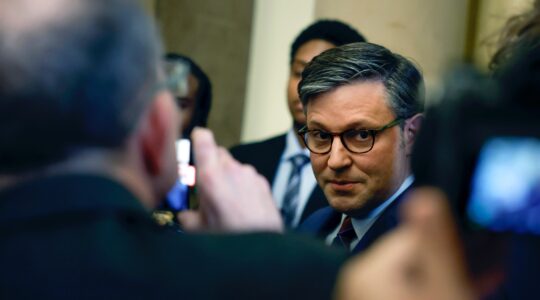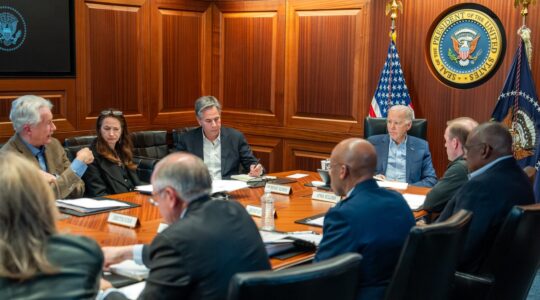REPORTER’S NOTEBOOK
WASHINGTON (JTA) — The theme of this year’s AIPAC policy conference was “Relationships Matter” — and to hammer home the point, the Washington Convention Center was plastered with mammoth banners picturing Israeli and U.S. leaders locked in warm exchanges: Harry Truman and Ezer Weizman, John F. Kennedy and David Ben-Gurion, Lyndon Johnson and Yitzhak Rabin, Richard Nixon and Golda Meir, Meir and Henry Kissinger, Ronald Reagan and Menachem Begin, Bill Clinton and Shimon Peres, Ariel Sharon and Hillary Clinton, and Ehud Olmert and George W. Bush.
They even had shots of Rabin and Gerald Ford, and the senior Bush and Yitzhak Shamir — two sets of leaders associated with some of the rockier moments in the U.S.-Israeli relations (though Ford and Rabin could have looked cozier). And though they have yet to meet as leaders, there was a shot of Barack Obama and Benjamin Netanyahu standing next to each other. And Peres and Obama.
With all the anxiety about possible Bibi-Barack tension, you’d think that would have been the one to play up. But hanging right behind the stage was a massive banner with Obama — and AIPAC’s outgoing president, David Victor.
Harman: A ‘warrior’ for Constitution
Rep. Jane Harman (D-Calif.) said she is “not a victim” but a “warrior on behalf of our Constitution and against abuse of power.”
“I will not quit on this until I am absolutely sure this can never happen to anyone else,” Harman said defiantly at the opening session of the conference, responding to reports that she was wiretapped while allegedly agreeing to intervene in the classified information case of two former AIPAC staffers.
Harman’s remarks came near the end of a panel discussion Sunday morning after it seemed the topic might not even come up.
When the conference schedule was released last month, just days after reports of the wiretaps surfaced, some chuckled at the irony that Harman was featured as part of the opening session. But nearly 40 minutes into the discussion Sunday morning, as moderator Dan Senor started to wrap up and asked the final question of the four panelists, no one had even mentioned the issue. So Harman took the matter into her own hands, winding up with a spirited defense of the Constitution and AIPAC.
“I know about the Constitution, I believe in the Constitution, I believe in the Fourth Amendment and I have never ever supported warrantless wiretaps on Americans, nor would I,” she said, referring to stories that the Bush administration thought she could be helpful in urging The New York Times not to reveal that the federal government had expanded its wiretap program to include domestic conversations.
“This issue is obviously creating a chilling effect on hard-working bipartisan members of Congress who care intensely about the U.S.-Israel security relationship, and have every right to talk to advocacy groups and our good friends about that relationship,” she added, to big applause.
She went on to say that her husband, Sidney, “would tell you that his wife is not a victim” but a “warrior on behalf of our Constitution and against abuse of power,” and that she won’t “quit on this until I am absolutely sure this can never happen to anyone else.”
Could there be a U.S.-Israel rift?
Two top Middle East experts expressed concern Sunday at the conference about potential rifts between the United States and Israel — on two different topics.
Robert Satloff, executive director of the Washington Institute for Near East Policy, said that by next year at this time, he worries about a possible “deep disagreement” about how “one really deals with the Iranian nuclear challenge.”
If the United States and Israel “are not totally on the same page from A to Z on this issue, and it is not handled properly, we may be dealing with the most serious face-to-face disagreement between the United States and Israel in the 61-year history of the relationship,” said Satloff during a panel discussion about the Middle East at the opening plenary session.
About 90 minutes later, Satloff’s colleague at the Washington Institute, David Makovsky, said the two governments could clash over another matter in the months to come.
“The settlement issue has been a major issue in the U.S.-Israel relationship” since the first settlement was built and “in my view could intensify,” said Makovsky, speaking at a breakout session dealing with Israel’s negotiations with the Palestinian Authority. “I don’t think the Obama administration or the Netanyahu government wants to pick a fight, but my fear is events on the ground sometimes have their own dynamic.”
Makovsky was discussing his idea that the Israelis and Palestinian should try to “demarcate the border” of an eventual Palestinian state now and allow Israelis to build more houses in the West Bank while Palestinians build their institutions. He believes coming to an agreement on land would be the easiest part of a peace agreement, since 75 percent of the settlers in the West Bank live on just 4.4 percent of the land.
Some love for Tennis Channel CEO
Among the speakers Monday morning at the conference was a man making his first visit to the event — the CEO of the Tennis Channel.
Ken Solomon wasn’t there to provide insights into the upcoming French Open; AIPAC was recognizing his February decision to refuse to broadcast a women’s tennis tournament in Dubai after Israeli Shahar Pe’er was denied an entry visa.
“I never dreamed my actions would have the reverberations they did, that something so clearly appropriate would engender this kind of response,” said Solomon to the 6,500 delegates. In fact, Solomon said he was “a little embarrassed to be up here.”
“Any one of you, had you been in my position, would have done the same thing,” he said. “It was a no-brainer.”
Dermer talks about ‘triple track’
New Israeli Prime Minister Benjamin Netanyahu told the conference via satellite Monday evening that he supported a “triple track” approach to talking with the Palestinians covering security, economic and political negotiations.
At a breakout session the day before, Ron Dermer, a top adviser to Netanyahu, explained how the prime minister would go about doing that and why he believes it will work. First, Dermer said Netanyahu would “work to change the reality on the ground,” praising Lt. Gen. Keith Dayton, U.S. security coordinator for the Palestinian Authority, for his work with Palestinians.
“It’s amazing that” during the Gaza operation late last year and early this year, “you had protests in European capitals and didn’t have them in Jenin, Nablus and Jericho,” Dermer said. “That says to me that maybe the security forces are doing a little bit better and maybe the Palestinians want a different life, a better future.”
Dermer then moved to the economic track, noting that a prime minister “can do a lot” to “move the bureaucracy along and to get through all the red tape” to get roads paved and buildings built.
“True economic development and secuity cooperation can create a context where political progress is possible,” he said.
And that political progress is more likely, Dermer said, because “something is happening in the Middle East that has not happened in the last 100 years” — the Arab world and Israel share “a common enemy” in Iran.
“On the basis of this common danger, not only can you work together on that common threat but also work together to advance peace,” he said.





